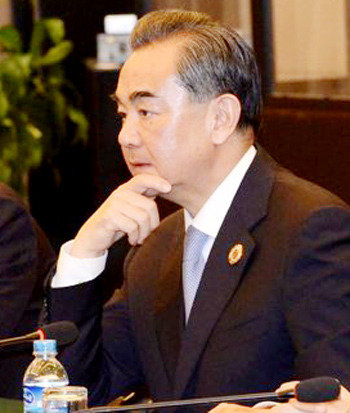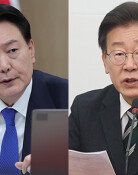Chinese foreign minister pressures S. Korea on THAAD deployment
Chinese foreign minister pressures S. Korea on THAAD deployment
Posted July. 26, 2016 07:02,
Updated July. 26, 2016 07:13

Calling a press conference by himself in an unusual move, Chinese Foreign Minister Wang Yi heavily addressed the issue of its territorial dispute over the South China Sea for more than an hour at the Vientiane Media Center on Monday. He did not even take questions regarding other issues including North Korea-China relations. He focused on reiterating Beijing’s previous stance that it will deny the ruling by the Permanent Court of Arbitration (PCA) in The Hague, which suggests "China’s claim has no ground in light of international laws." When asked about his meeting with North Korean Foreign Minister Ri Yong Ho, Wang simply commented “Good” while leaving the conference venue.
On other pending issues, the top Chinese diplomat used bilateral meeting format. On the planned deployment of the Terminal High Altitude Area Defense system on the Korean Peninsula, he almost took act that can be construed as being a diplomatic gaffe during the South Korea-China foreign ministers’ meeting on Sunday. “The recent measure by South Korea is an act that is undermining the foundation for our bilateral trust," Wang said when meeting his South Korean counterpart Yun Byung-se, making direct criticism against Seoul in an undiplomatic matter.
Such response from Beijing over the THAAD deployment on the Korean Peninsula had been widely expected. Despite this, Seoul said it had no choice but to seek a South Korea-China meeting. “THAAD is a sovereign act that is directly linked to Korea’s national security, and we had no intention to persuade or make appeal to Beijing in the first place,” said a government source. According to the plan, chances were high that South Korea and China would engage in a war of nerves during their encounter, but Seoul reportedly judged that it was better to meet than avoiding a meeting.
If a meeting between foreign ministers from Seoul and Beijing fails to take place again after the occasion of the Asia-Europe Summit, it could be considered as signal for "disorder and trouble in Seoul’s THAAD diplomacy." Another reason was if just North Korea-China foreign ministers’ meeting were to take place while Seoul and Beijing have yet to meet, the backlash could rather be uncontrollably strong. Based on such judgement, South Korea first offered China to meet, and gave Beijing conveniences to the extent possible, saying, “It is okay even if midnight. The venue can be chosen by China.”
After all, the meeting took place at hours that China accepted (12:15 a.m. Monday, Korea time), and the venue was Don Chan Palace Hotel, the lodging for the Chinese delegation. The two sides originally agreed to only release the scene of handshaking without having any opening talks, but the Chinese side invited up to 14 reporters, saying, “Since the venue is spacious, we could have many,” and lashed out "undiplomatic remarks." In the opening remarks, Wang did not use the term "THAAD," but when asked whether the THAAD issue was discussed, the Chinese foreign minister bluntly replied, “Of course.” In their meeting, South Korea and China reaffirmed their earlier stances. “We explained to Beijing that the measure is part of efforts to ensure our national interest, while Beijing called on Seoul to halt the process of deploying the THAAD battery," a diplomatic source in Seoul said.
비엔티안=조숭호기자 shcho@donga.com







